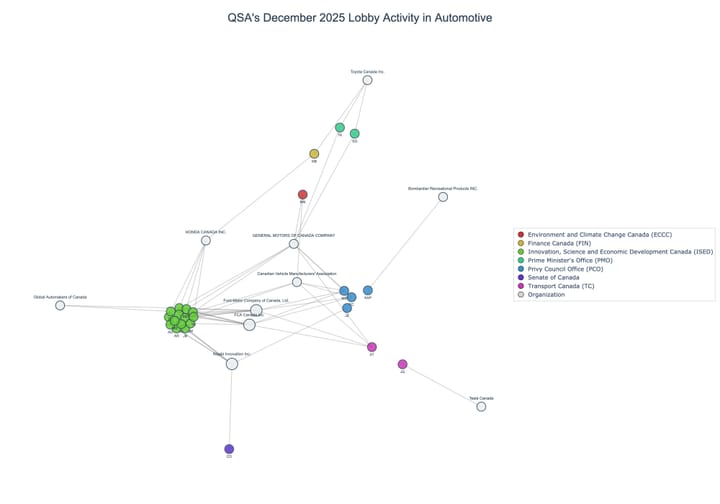QSA's Week in Automotive (#40, 2025)
Canada reports progress in auto theft reduction; Fredericton receives federal support for zero-emission transit planning; Senate committees debate CUSMA, EV mandates, and critical minerals; US adds entities to export control list over Iran links.

Good morning! This is Queen Street Analytics' weekly roundup of regulatory developments, legislative discussions, political announcements and other government-related news for car manufacturers, parts suppliers, car dealers, and others in the automotive industry. Every Monday, we break down the most important updates in this space in under five minutes.
Want to track the upstream and downstream forces affecting Automotive? Don’t miss this week’s updates in Manufacturing and Oil & Gas.
Dates: 2025-10-05 to 2025-10-11
📋 In This Week's Newsletter
• 🇨🇦 Canadian Federal GR News
• 🇺🇸 US Federal GR News
• 🗺️ Canadian Provincial GR News
• 📚 What We're Reading This Week
Canadian Federal GR News
Government of Canada Updates on National Action Plan Combatting Auto Theft
On October 9, 2025, Public Safety Minister Gary Anandasangaree released an update detailing progress under the National Action Plan on Combatting Auto Theft. Since May 2024, the Action Plan has driven efforts to prevent vehicle theft, recover stolen vehicles, disrupt their export, and address organized crime. Recent measures include sharing Import/Export VIN data with external partners such as Équité and Carfax, increased funding for Quebec police to support CBSA in intercepting stolen vehicles at ports and rail yards, and expanded cargo container examinations to facilitate RCMP vehicle detection technologies. The government also awarded grants of up to $150,000 for eight projects developing anti-theft technologies, delivered specialized investigative training to law enforcement, and completed targeted security assessments at high-risk port facilities in Vancouver, Montreal, and Halifax. Police-reported motor vehicle theft incidents declined by 17% in 2024, with a further 19% decrease in the first half of 2025, according to Équité Association.
Sources: Announcements: www.canada.ca

Federal Support for Fredericton’s Zero-Emission Transit Transition Plan
On October 8, 2025, Minister Gregor Robertson joined Fredericton Mayor Kate Rodgers and CUTRIC President Josipa Petrunic to announce a $177,140 federal investment for Fredericton’s zero-emission transit fleet strategy. The funding, provided through the Zero Emission Transit Fund, will support the development of a comprehensive plan evaluating current fleet status, feasibility, optimization, and implementation strategies for transitioning to low-carbon vehicles. The project covers economic, technological, and environmental aspects, with additional annual funding and a $3 million allocation for three hybrid buses via the Rural Transit Solutions Fund. The initiative is part of Fredericton’s broader efforts to reduce its carbon footprint and modernize public transportation.
Sources: Announcements: www.canada.ca
Senate Committee Reviews CUSMA and Automotive Sector Trade Challenges
On October 9, 2025, the Senate Standing Committee on Foreign Affairs and International Trade convened to address the Canada-United States-Mexico Agreement (CUSMA) and its impact on the North American auto industry. Brian Kingston (Canadian Vehicle Manufacturers' Association) advocated for the removal of U.S. Section 232 tariffs and critiqued Canada’s federal EV mandate, while Flavio Volpe (Automotive Parts Manufacturers' Association) warned against tariffs and called for a rules-based CUSMA renewal. Both highlighted the need for trilateral alignment, particularly in trade policies involving China. Kingston identified the EV battery supply chain as a priority for CUSMA review, and Volpe referenced Canadian companies' roles in the U.S. parts industry. Senators sought input on infrastructure and collaboration strategies, with Kingston promoting joint development and Volpe noting ongoing advocacy against tariffs.
Sources: Transcripts: senparlvu.parl.gc.ca
Senate Committee Assesses Federal Critical Minerals and Clean Energy Strategies
The Standing Senate Committee on Energy, the Environment and Natural Resources met October 9, 2025, with Auditor General Commissioner Jerry V. DeMarco presenting findings on Canada’s critical minerals strategy. The federal government has allocated $3.8 billion over eight years to support responsibly sourced minerals for green technologies. The audit found limited analysis of environmental and Indigenous impacts and slow progress in sustainable development, with Canada aiming for 90% renewable electricity by 2030. Issues raised included the need for comprehensive data, intergovernmental cooperation, and concerns over exporting raw materials without added value. The committee questioned the feasibility of meeting energy efficiency targets and discussed operational deficiencies in federal strategies, with new performance results expected in 2026.
Sources: Transcripts: senparlvu.parl.gc.ca
StatsCan Releases Data on Economic Contribution of Critical Mineral Production
On October 6, 2025, Statistics Canada published data on the economic role of critical mineral production for 2023. Thirty-four minerals are classified as critical by Natural Resources Canada due to their importance in technology and industry, including applications in EV batteries and defense. These minerals support national security and the green and digital economy. Federal investments include two major mining projects among the first five considered by the Major Projects Offices, with a focus on minerals essential for the automotive and energy sectors.
Sources: Open Government Data Set: www.statcan.gc.ca
Senate Sitting Addresses Automotive Supply Chains, Clean Energy, and EV Sector
During the October 9, 2025 Senate sitting, Senators raised questions about energy policy, trade corridors, and the EV sector. Senator Tony Loffreda requested updates on support for the EV sector, and Minister Tim Hodgson affirmed ongoing government backing. The session also covered concerns on foreign competition, oil export reliance, and the prioritization of Canadian products. Minister Hodgson discussed private sector alignment with climate goals, ongoing infrastructure initiatives, and Indigenous involvement in energy projects. The discussions included the Port of Churchill’s operational potential and strategic negotiations regarding trade and energy exports.
Sources: Transcripts: senparlvu.parl.gc.ca
US Federal GR News
Commerce Department Adds 29 Entities to Export Control List Over Iran Links
On October 9, 2025, the Bureau of Industry and Security (BIS) under the U.S. Commerce Department amended the Export Administration Regulations by adding 26 entities and 3 addresses to the Entity List, affecting China (19 entries), Turkey (9), and the UAE (1). These entities were identified as acting counter to U.S. national security or foreign policy interests, with several linked to supplying components to Iran’s IRGC-QF and facilitating procurement for Iranian proxies. Notable additions include Goodview Global (China), TGB Aviation (Turkey), and Royal Impact Trading L.L.C. (UAE), each involved in diversion or transshipment of controlled items to Iran. The changes impose additional license requirements and restrict exceptions for exports and transfers involving these entities, with applications reviewed under a presumption of denial. The rule is effective October 8, 2025, with a savings clause for shipments en route before that date, and is authorized under the Export Control Reform Act of 2018.
Sources: U.S. Federal Announcements: www.federalregister.gov
Canadian Provincial GR News
Manitoba Introduces Legislation to Maintain Affordable Vehicle Insurance Rates
On October 6, 2025, Manitoba announced new legislation to enshrine the registered owner model for vehicle insurance, ensuring Manitoba Public Insurance remains focused on affordability and stability for consumers.
Sources: Provincial Announcement: news.gov.mb.ca
BC's Attorney General Statutes Amendment Act Proposes Changes to Vehicle Insurance Model
The BC government introduced amendments to the Insurance (Vehicle) Act on October 7, 2025, retroactively validating decades-long reimbursements by ICBC for health-related services from vehicle accidents and ceasing future reimbursements, with no impact on accident benefits or basic insurance rates.
Sources: Provincial Announcement: news.gov.bc.ca
BC Government Advances Consumer Protection Against Credit Fraud
On October 9, 2025, British Columbia announced the second phase of amendments to modernize consumer protection laws, including free monthly credit report access, new rules for credit agencies, and enhanced protections under the Motor Dealer Act.
Sources: Provincial Announcement: news.gov.bc.ca
Nova Scotia Launches Online Road Test Booking System
Nova Scotia introduced a new online platform for booking, rescheduling, and paying for standard driver’s licence road tests on October 6, 2025, aiming for greater convenience for residents and businesses.
Sources: Provincial Announcement: news.novascotia.ca
What We're Reading This Week
- No going back to former free trade system, Lutnick says: Lutnick discusses the outlook for North American auto tariffs and trade frameworks.
- Good money chases bad in Ottawa’s Field of EV Dreams: Analysis of federal spending on electric vehicle initiatives and outcomes.
- Transport Canada recalls BMWs over starter fire risk, Toyota, Nissan and Chevy models also recalled: Multiple vehicle recalls announced due to starter fire risks.
- Jaguar Land Rover Bailout Shows Rising Cost of Cybercrime: Coverage of Jaguar Land Rover's financial measures following a cyberattack.
- China Flexing Battery Supply-Chain Clout With Fresh Export Curbs: China implements new export controls affecting global battery supply chains.


